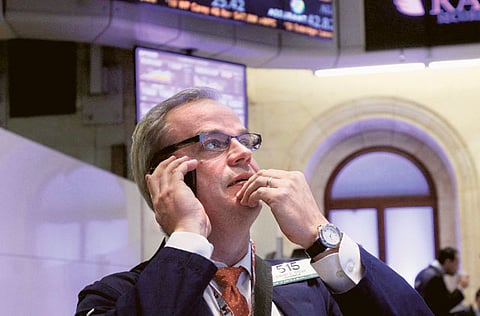Markets await rally from major cash flood
Move could make eurozone more vulnerable

Dubai: The prospect of a big cash boost by the European Central Bank (ECB) buoyed equity markets across Asia yesterday as the expectation of liquidity spill-over from Europe was seen supporting the recent rally.
The euro gained as Euro-pean markets traded flat yesterday due to a decline in US durable goods orders.
The ECB is expected to announce the second tranche of its long-term refinancing operation (LTRO) today. Analysts expect a $600 billion to $1 trillion (Dh2.2 trillion to Dh3.67 trillion) boost.
First tranche
Last December, the ECB announced the first tranche of its LTRO and promised that it would lend as much as banks wanted at a low rate of 1 per cent for three years. While it succeeded in averting a credit squeeze in the Eurozone, it also gave a big boost to markets around the world.
Analysts said the first tranche of ECB funding had an enormous and positive impact on reviving the risk appetite in markets but the second tranche is largely priced in.
"Increased ECB involvement resulting in monetisation of debt is being implemented partially through the LTRO operation.
"Availability of liquidity is certain to have a positive impact on markets across the world," said Paul Marson, Chief Investment Officer of Lombard Odier, a Geneva based private bank.
Fund managers chasing yield and higher returns are likely divert this liquidity into emerging market debt and equity as happened following the two rounds of quantitative easing in the US.
"The primary impact of the LTRO 11 is likely to be in Europe. But cheap and abundant liquidity will have a positive impact on both credit and equity markets in the emerging markets including the Middle East region," said Rezwan Mirza, Managing Director and Head of Corporate Coverage at Barclays Bank.
Doubts remain, however, about the ability of the operations to spur lending activity necessary to avoid a credit crunch in the euro area, economists said. There have been concerns that banks are simply hoarding the cash.
Although the policy of pumping more liquidity is not really helping the European economies to grow, economists said taking a wider range and lower quality of collateral in exchange for three-year funding eliminates a lot of anxiety from the short-term money markets.
Semantics
"Whether or not one calls these operations QE is largely semantics. The important point is that large-scale purchases or loans tend to lower market interest rates and embolden banks to lend more," said John Greenwood, Chief Economist of Invesco.
However the veteran economist said that the operations may also result in unintended consequences, including a temporary rise in the euro that could hinder the Eurozone's most debt-strapped countries to regain competitiveness. The single currency rose 0.3 per cent to $1.3440 as oil prices slipped and some risk appetite returned to currency market yesterday.
Limited economic impact
Economists and market pundits differ on the economic outcome of the new monetary policy offensive. "The positive psychological impact on markets and, particularly, government bond markets has been obvious from the start," Carsten Brzeski, an economist at ING Bank, wrote in a note to clients. "The economic impact, however, remains still limited," he said.
Analysts say ample liquidity and reduced risk of near-term bank failures mean the western markets are unlikely to reverse recent gains, while the excess liquidity form LTRO II is likely to find its way into emerging market asset classes.



